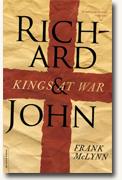Richard and John
Frank McLynn
book reviews:
· general fiction
· chick lit/romance
· sci-fi/fantasy
· graphic novels
· nonfiction
· audio books
· author interviews
· children's books @
curledupkids.com
· DVD reviews @
curledupdvd.com
newsletter
win books
buy online
links
home
for authors
& publishers
for reviewers

 |
Richard and John: Kings at War Frank McLynn Da Capo Press Paperback 608 pages September 2008 |
|
Click here to read reviewer Dave Roy's take on Richard and John: Kings at War. There's always a thrill in turning a myth on its ear. Frank McLynn, historical author (Napoleon, 1066, The Jacobites, etc.) enjoys the contrary thrill of putting credence back into the myths in Richard and John.
Richard spent much of his youth battling his father, consolidating territory, and refusing to pay obeisance to Henry the Young King, who ruled simultaneously with his father. Richard's coronation was celebrated with rejoicing among his supporters but marred by the bloody slaughter of a group of wealthy Jews who had come to offer gifts. "To his credit," McLynn recounts, "Richard dealt harshly with the rioters once order was restored; his motive was not philo-Semitism so much as aristocratic outrage that a vulgar mob had defiled his coronation day." Richard spent much of his reign raising money to fight, and then fighting, his arch-enemy Saladin in the Holy Land, and has been maligned for sitting on the throne for only 6 months, giving John a chance to try to stage a coup while he was away. However, Richard was more French than English, so perhaps his absence from a country he considered far too rainy can be excused. He died from the wound of an errant arrow, and his brother John ascended to the throne. True to their legendary roles, Richard pardoned the bowman, while John later had him flayed to death. As much as modern historians have succeeded in presenting Richard with all his warts on display, they have not succeeded in the contrary exercise - demonstrating that John was any better than schoolchildren were told he was. His greatest legacy to the English people, arguably, was the Magna Carta, sometimes idealized as a blueprint for democracy in an age lean on human rights. But as McLynn makes clear, the document did not represent enlightened thinking on John's part. It was foisted upon him by the noblemen whom John had been cheating, forcing him to give back lands he had taken without "proper judgment." In doing so, it held out to all men the possibility of obtaining justice, free from the fear that a bribe could buy a ruling against them. It established the means by which ordinary people could hold onto their property and put responsibility for proving guilt onto the apparatus of the law, instead of burdening a defendant with establishing his own innocence. However, the Magna Carta was weakened by the many veins of self-interest that ran through its creation; McLynn eloquently calls it "a farrago, an olio, a gallimaufry," thrice cursing it with delicious words which would probably have been familiar to John and his disgruntled barons. While Richard was known as "Lion Heart," John was burdened with the insulting nickname "Soft Sword," a fact we did not learn in school. McLynn's book gives the sense of tireless research and dedication, along with a determination to breathe life into dry documents and analyze questionable legends. Scholars and real people can read it for the feeling of the times and the character of its protagonists. Originally published on Curled Up With A Good Book at www.curledup.com. © Barbara Bamberger Scott, 2007 |
| Also by Frank McLynn: |
|
|
|
 Click here to learn more about this month's sponsor! |
|
| fiction · sf/f · comic books · nonfiction · audio newsletter · free book contest · buy books online review index · links · · authors & publishers reviewers |
|
| site by ELBO Computing Resources, Inc. | |
 It's a story that most English-speaking children were fed with their porridge: two brothers who became
kings, who reigned in opposite ways, whose legacies are as different as chalk and cheese. One went heroically crusading, perhaps staying away too long; the other pulled his homeland apart, possibly making his subjects wish he would leave. It set the stage for the apocryphal Robin Hood waging guerilla warfare against the evil King John, maintaining loyalty to the memory of good King Richard. John was mistrusted by his friends; Richard was respected by his enemies. Sons of Eleanor of Aquitaine, they inherited both her love of freedom – like Richard, she participated in the Crusades - and her proclivity for meddling in government - like John, she manipulated the law for her own purposes, as in the annulment of her first marriage so that she could wed their father, Henry II.
It's a story that most English-speaking children were fed with their porridge: two brothers who became
kings, who reigned in opposite ways, whose legacies are as different as chalk and cheese. One went heroically crusading, perhaps staying away too long; the other pulled his homeland apart, possibly making his subjects wish he would leave. It set the stage for the apocryphal Robin Hood waging guerilla warfare against the evil King John, maintaining loyalty to the memory of good King Richard. John was mistrusted by his friends; Richard was respected by his enemies. Sons of Eleanor of Aquitaine, they inherited both her love of freedom – like Richard, she participated in the Crusades - and her proclivity for meddling in government - like John, she manipulated the law for her own purposes, as in the annulment of her first marriage so that she could wed their father, Henry II.